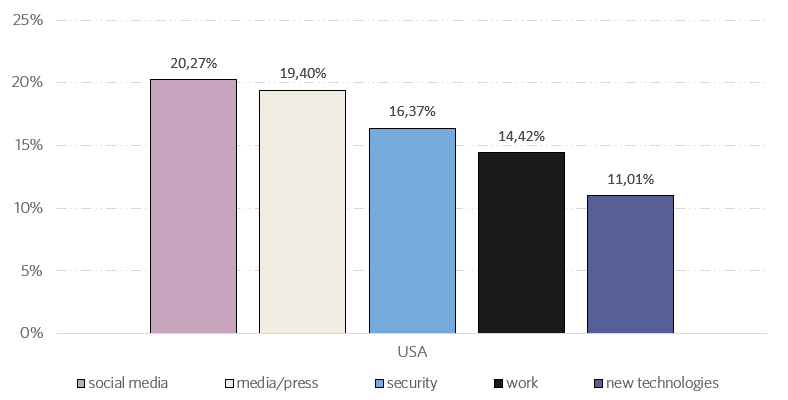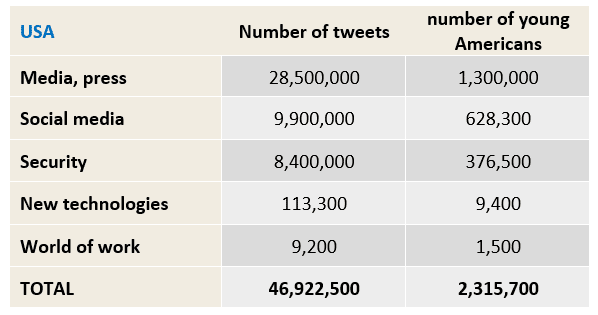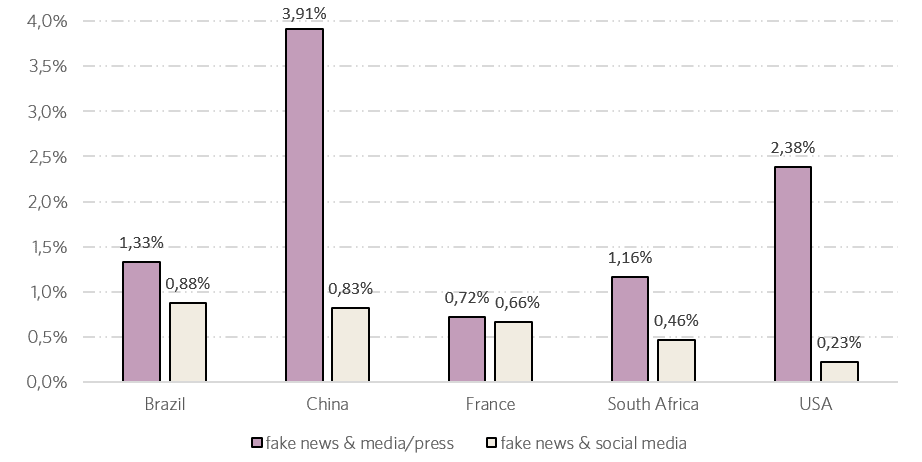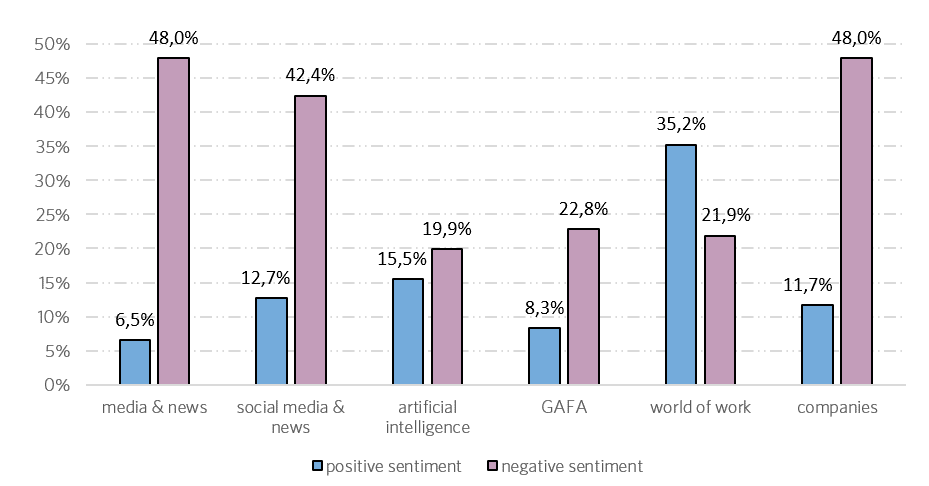This analysis gathers and delves deeper into the American data presented in the EYES 2021 (Emergy Youth Early Signs) report on the emerging concerns of 18- to 24-year-olds of five nationalities: Brazilian, Chinese, American, French, and South African.
The EYES 2021 report published in February 2022 sought to analyse the perceptions of 18- to 24-year-olds from the five countries in which SKEMA Business School operates, on five political issues prioritised by young people in that age group: traditional media and the press, social media, security, new technologies, and the world of work. The report is the fruit of qualitative interviews conducted with 36 SKEMA students, and of social listening carried out on Twitter between July 2020 and June 2021. The detailed methodology for this work is annexed to the EYES 2021 report.
Young Americans are Vocal on Conversations around Traditional Media and Social Media
Twitter is a popular social network in the United States, with 73 million American users, making it the country with the most Twitter users worldwide (Statista, July 2021). The data collected for the EYES study shows that Twitter also is a popular platform for expression among young people. Young Americans represent on average nearly 19% of users who expressed views on one of the five themes we selected.

Young American engage more with topics relating to the media and the press and to social media. Over the one-year span of our study, 1.3 million young Americans mentioned the media and the press on Twitter. They represent 19.4% of American Twitter users taking part in the conversation. Social media is also a topic of concern with close to 630,000 young people, amounting to 20.3% of Twitter users expressing views on the matter. Engagement drops for the topic of security with less than 377,000 users representing 16.4% of the online conversation. American youths show timid interest in new technologies and the world of work, with respectively only 9,400 and 1,500 18–24-year-olds expressing views. They amount to only 14.4% and 11% of their respective national conversations.

Traditional Media and the Press: a Strong Critical Sentiment
Young Americans are the most vocal about traditional media and the press, both in terms of numbers of tweets and of shares in their national conversation. During the period studied, then-President Donald Trump had strained relations with the traditional media outlets and criticised their partiality. Whether because of this or not, we see a clear trend among young Americans toward the denigration of traditional news sources.
The negative sentiment of 18- to 24-year-olds toward the terms ‘media’ and ‘news’ is one of the strongest, with almost half of the tweets containing these two words having a negative connotation. The issues of trustworthiness, credibility and reliability of traditional media outlets are heavily discussed in the USA and account for 256,000 tweets.
Young Americans are also prone to mention the state and the government, with more than 1.1 million tweets associating such expressions with ‘media/press’. This is the first words’ association among our selection of keywords.
When talking about the media and the press, the term ‘fake news’ is also widely used, appearing in 671,400 tweets. It is the second most recurring term. The association of the words ‘media’ and ‘manipulation’ generates 35,400 tweets (between 1 May 2020 and 30 April 2021). Moreover, #FakeNews and #FakeNewsMedia are popular hashtags associated with this theme. Young Americans’ tweets associate ‘fake news’ to ‘media/press’ more than 10.5 times than to ‘social media’.

A Certain Unease with Regards to the Digital Sphere and Social Media
While criticising traditional media, young Americans remain lucid as to the reliability of the information accessible via social networks. Indeed, a strong negative sentiment emerges from the association of the expressions ‘social media’ and ‘news’ (42.4% of tweets); however, not as strong as the one associated with traditional media.
Besides, social media seems readily used for collective action and activism, with a strong leaning toward political issues. Within this context, young Americans associate them with the expressions ‘change’, ‘act’ or ‘future’ in about 196,600 tweets. In the top 10 hashtag for this theme, we find: #EndSARS, #SaveSheikhJarrah, #WhatsHappeningInMyanmar, #CapitolRiots, #DCRiots – all relating to major news events in the United States and abroad.
However, young Americans seem to be more careful as to the benefits of social networks when it comes to self-image and mental health. The study reveals a significant volume of conversations about ‘self-confidence’, ‘self-esteem’ and ‘self-image’. The term ‘bodyshaming’ appears in 52,200 tweets and is mainly used by women (60.2% – between 1 May 2020 and 30 April 2021). Although much more minor in terms of occurrences, #DigitalDetox illustrates an awareness of the addictive nature of the social networks. It refers to a digital detoxification to cure addiction and reflects the sharp rise among 18- to 24-year-olds of a certain unease with regard to the digital sphere and social media.

Security Issues: Do Young Americans have an International Outlook?
It would seem that security within their national borders is not the only concern of young Americans. Indeed, the ranking of the most popular hashtags indicates that they are more enthusiastic about events taking place outside of their own country.
Eight of the 10 most popular hashtags refer to events outside of the USA’s frontiers: #WhatsHappeninginMyanmar (825,500 occurrences), #Myanmar (541,200), #MilkTeaAlliance (468,200), #EndSARS (86,300), #AntiFascistRevolution2021 (48,900), #May2Coup (27,000) and #April19Coup (22,300). The volume of these discussions represents nearly a quarter of all the tweets of 18- to 24-year-olds on the topic of security. In comparison, the hashtags relating to the pro-Trump riots and the Capitol attack, #AnatomyofCapitolAttack (12,700), #CapitolRiots (6,100) or #SeditionHunters (7,300) represent just 0.16% of the volume of tweets, and this even though the events generated a considerable increase in the volume of messages associated with security in January 2021.
Do these observations reflect a growing interest among young Americans in what is happening beyond their borders? Rather, might the highly political nature of the hashtags mentioned above reflect a certain performative activism, as was the case when the #BlackLivesMatter temporarily went viral in the spring of 2020? Might we imagine that the further away an event is from one’s own country, the more troubling it seems because it is not controlled/controllable?
Mixed Feelings about Artificial Intelligence
The conversations about AI use a technical vocabulary, as evidenced by the most popular hashtags: #MachineLearning (3rd place), #DataScience (4th), #100DaysOfCode (5th), #DeepLearning (6th), #Python (7th), #IoT (Internet of Things, 8th), #BigData (9th), #NLP (Natural Language Processing, 10th). The general sentiment on artificial intelligence is mixed, with almost 20% of negative tweets against 15.5% of positive ones.
GAFA & Big Tech: Minor Cause for Concerns?
Only 4,300 tweets mention GAFA over the study period. Sentiments toward them seem rather negative. Yet, young Americans do not seem to feel concerned by the powerfulness and omnipresence of Big Tech. For example, while young French people used Donald Trump’s ban from Twitter as an excuse to discuss freedom of speech and the censorship power of social media platforms, young Americans did not. In tweets containing the expression ‘GAFA’, #Trump or #TrumpBanned are absent from the top 10 hashtags for the theme in the United States, while they both appear in France.
Young Americans Distrust the Corporate World
Young Americans see the world of work in a rather positive light, with 35.2% of positive tweets, and 22% of negative ones. Nonetheless, the most engaging tweets on the matter mention the difficulties encountered by minorities. Many also talk about change and the future: #FutureofWork is the leading hashtag for this theme. Gen Z’s expressions on Twitter highlight a desire for greater inclusivity and equity in the professional world. Young people are also interested in sustainable development, and environmental and social responsibility.
However, young Americans hold a very negative perception of the corporate world. Almost half of tweets containing the word ‘companies’ is negative. It seems that this distrust is global rather than specific to the USA. The same trend can be found among Brazilian, French and South African youths. Our analysis, Youth at Work: Distrust of the Corporate World and Political Demands offers insights on reasons for such an international and unanimous lack of trust.


